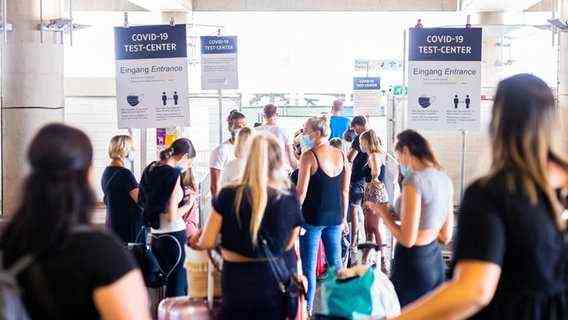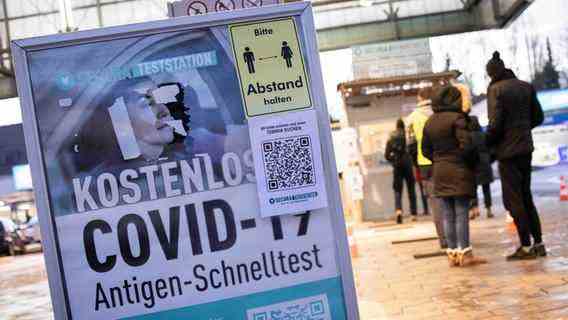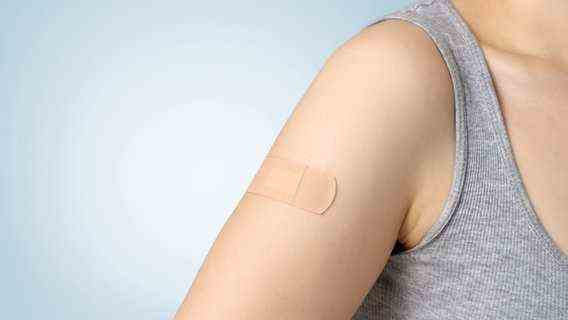Status: 01.02.2022 6:00 p.m
In the coronavirus update from NDR Info, the virologist Christian Drosten explains under what circumstances the BA.2 subtype could prolong the omicron wave, why an omicron infection does not replace vaccination and why large-scale PCR testing should be ended in the medium term.
No more masks, no more proof of vaccination: Denmark was the first EU country to lift all corona restrictions – despite a seven-day incidence of over 5,000. In view of the apparently mild course of omicron infections, the debate about easing is also making waves in Germany. But scientists keep pointing out that the situation in Denmark cannot be compared to that in Germany, including Christian Drosten: “One thing that has not changed is the vaccination gap. The vaccination rate in Germany has even recently fallen again”. , says the head of virology at the Berlin Charité in the new podcast episode. In contrast to Denmark, which has now decided to relax extensively in view of the high vaccination rate, there should be no all-clear in Germany.
Omicron: Risk of infection with BA.2 clearly higher
The omicron subvariant BA.2 also plays a role here. The subtype, which is well on the way to becoming dominant in Denmark, has so far rarely been detected in Germany. In the last Weekly report of the Robert Koch Institute (RKI) states that the proportion of BA.2 sequences in the second calendar week was 2.3 percent. A Preprint from Denmark suggests that the subtype could spread even more easily. According to these preliminary figures, the risk of infection is clearly higher than with the omicron variant BA.1, which is still prevalent in Germany. The probability that the virus will be passed on is reduced in vaccinated contact persons, but significantly increased in unvaccinated first-time sufferers in a chain of infection.
Drosten: The fitness advantage of the new subtype could predominate
For Drosten, the data suggests that BA.2 could have a fitness advantage and thus higher transferability. Or, to use one of his favorite car comparisons: “The BA.2 engine has a few more horsepower.” In BA.1, on the other hand, the ability of the variant to evade the body’s immune response is considered critical to rapid spread.
The increase in viral fitness at BA.1 compares to the emergence of Alpha early last year. The alpha version fueled the action a year ago and extended the winter wave. Drosten does not rule this out for the current wave either. The BA.2 proportion of infections may also increase in Germany, but more slowly than in other European countries.
Transmissions in schools – hope for Easter holidays
The virologist names Easter as the “planning horizon” for easing the pandemic situation in Germany: “We have clearly found that the transmissions are currently being fed from school operations. The Easter holidays will put a stop to that at the latest,” he says. “In addition, it will be warmer after Easter and the incidence will probably not pick up as much speed.” It is not possible to predict whether BA.2 will be completely predominant until mid-April. The data are not precise enough for this.
Reinfections – omicron infection does not replace vaccination
It is not advisable to immunize the population by infecting the unvaccinated with either of the omicron variants. Several studies now show that the probability of repeated infections is high. “The calculation of an omicron infection as a vaccination through the back door does not work,” says Drosten, referring to England, where the population is much more immunized than in Germany. Nevertheless, the reinfection rate there is estimated at almost ten percent.
“The calculation of an omicron infection as a vaccination through the back door does not work.”
Christian Drosten
Ideal immunization: three doses of vaccine plus infection
With a view to the many unvaccinated people in Germany and imponderables such as Long Covid, one cannot simply allow an infection to spread, says Drosten: “The ideal immunization is that you have a complete vaccination immunization with three doses and then on the basis of this immunization yourself infected with the virus for the first time and also for the second and third time and that this results in mucosal immunity (Control of the pathogens already on the mucous membrane/red.) developed without having to put up with severe courses.” Anyone who has gone through this is probably immune for years and will not reinfect themselves again. The intensity of the infection determines how persistent the immune protection can be.
Booster makes immune reaction “better, more special, more sustainable”
In Germany, Omikron has not yet made a significant impact on the elderly. “But it will get there. We can only hope that the vaccination gap will be closed during the summer break and that we will hopefully find a different path.” Especially the third vaccination, which is also proven by new ones Data on vaccination effectiveness against Omicron (BA.1 and BA.2) from England, be decisive. The booster is a “tuning”, says Drosten, it makes the immune reaction “better, more specific and more sustainable”.
In the long term, i.e. within a time horizon of two to three years, Drosten expects that the need for revaccination will decrease: “The intervals will become larger because the virus makes fewer leaps in evolution, but develops continuously and the population does so don’t even notice anymore.” He expects that because other corona viruses are also relatively stable. “The influenza virus makes leaps every six or seven years, but that’s not the case with corona viruses.”
Drosten: “Intensive PCR testing must stop in the medium term”
The debate about limited PCR test capacities in Germany and the associated The scientist considers distortions in the determination of the number of cases to be overrated. In his opinion, when monitoring Covid-19 diseases, one must slowly move on to using existing instruments for monitoring anyway. “The intensive PCR testing must stop in the medium term. We cannot retest every infection,” says Drosten, referring to the increasing number of milder infections in vaccinated people.
Further information
The health authorities are now overwhelmed with efficient contact tracing and breaking chains of infection. The current high level of testing effort primarily shows how widespread the virus is in the population. In order to get this information, however, it is sufficient to fall back on existing monitoring systems. As with the flu, the frequency and severity of the illness could be extrapolated relatively reliably on the basis of random samples in households, medical practices and hospitals. It also saves a lot of effort and money. “Politics will have to decide that at some point,” says Drosten. “I think we’re very close to that point and we should get into this discussion very seriously.”
Note: The next regular episode of the Coronavirus update will be released on February 15, 2022.
Further information







